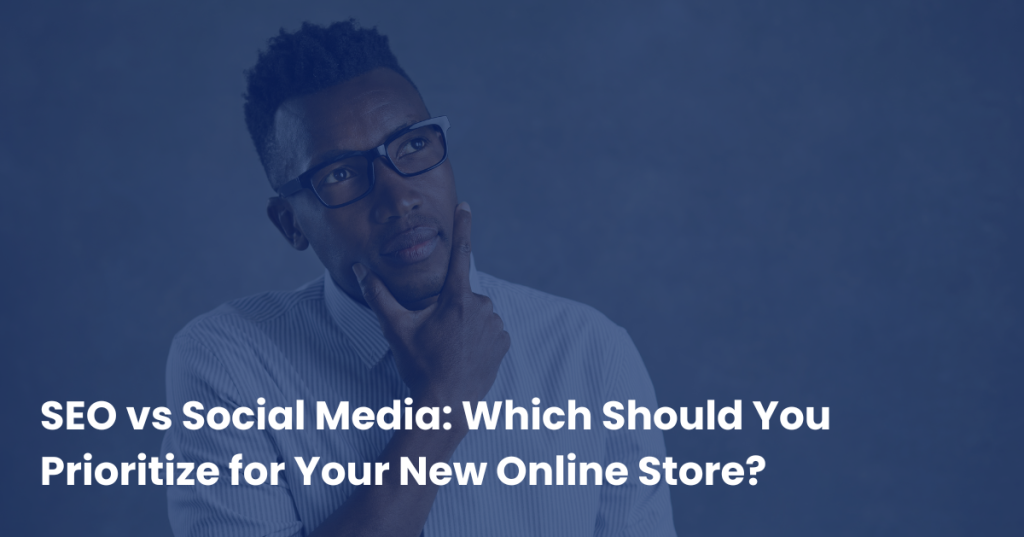You’ve finally got it—the winning, business model, the next big thing—and you’re ready to market your product/service. But now, you’re suddenly faced with a crucial decision: Where should I direct my marketing efforts?
With so many options available, it can be overwhelming to determine where to invest your resources. But you’re not alone, though. It’s a common dilemma that many startups and new business owners face.
In this article, we’ll delve into the merits of two of the most popular digital marketing channels, SEO and Social Media, and unravel their unique strong points. At the end of this blog post, you’ll be equipped to make an informed decision on which strategy to prioritize when you start an online store.

SEO Vs Social Media—Which one is better?
Let’s cut to the chase, which is better between the two marketing strategies if you’re starting a new online store?
The truth is, both strategies have their unique advantages, and it all depends on many factors like your short-term and long-term goals, target market, marketing budget, and the like. To further understand, let’s break them down:
Search Engine Optimization
When it comes to establishing a strong online presence and driving organic traffic to your ecommerce site, SEO emerges as a powerful contender. Here’s why:
- Long-Term Visibility: SEO focuses on optimizing your website and its content to rank higher in search engine results pages for relevant keywords. Albeit slow compared to paid and even with organic social media marketing, investing in SEO lays the foundation for long-term visibility, as organic search results can generate consistent traffic even without ongoing advertising expenditure.
- Targeted Traffic: SEO allows you to target specific keywords and phrases that align with your business offerings. This means you can attract highly relevant visitors or local customers who are actively searching for products or services like yours.
- Credibility and Trust: Ranking prominently in organic search results signals credibility and trustworthiness to potential customers. Users tend to trust websites that appear in top positions, perceiving them as authoritative and reputable sources.
- Cost-Effective in the Long Run: While SEO requires an initial investment of time and resources, it can be a cost-effective strategy in the long run. Once your website gains organic visibility and starts ranking well, you can continue to reap the benefits without ongoing ad spend, making it an attractive option for businesses with limited budgets.
Now that we’ve explored the advantages of SEO, let’s delve into the strengths of social media marketing for your new online store.
Social Media Marketing
Social media has made major buzzes in digital marketing and has reinvented the way brands connect with their customers. With the rise of platforms like Facebook, Instagram, Twitter, LinkedIn, and most recently, TikTok, social media has become an integral part of people’s lives, presenting a vast opportunity for new and emerging brands to sell online.
Consider the following factors:
- Immediate Reach and Engagement: Social media platforms provide instant access to a vast audience, allowing you to connect with new customers and engage them directly. With well-crafted content and strategic targeting, you can quickly build a loyal following and drive immediate results.
- Precise Targeting Capabilities: Social media platforms offer robust targeting options, allowing you to reach specific demographics, buyer personas, interests, and behaviors. This level of precision targeting enables you to tailor your marketing efforts to a highly relevant audience, maximizing the chances of conversion.
- Brand Awareness: Social media platforms are excellent vehicles for building brand awareness and expanding your reach. Social media also enables content sharing, which can result in exponential exposure as users share your posts with their own networks.
- Flexibility and Adaptability: Social media marketing allows for flexibility and adaptability in your marketing campaigns. You can test different content formats, messaging strategies, and advertising approaches to find what resonates best with your audience. Additionally, social media platforms offer insights and analytics that provide valuable data on campaign performance that enables you to make data-driven decisions.
What should you go for with your ecommerce business?
Both SEO and social media marketing offer distinct advantages for new online stores. The right strategy for your ecommerce store depends on your specific goals, target audience, and overall marketing objectives. But to make it simpler, here’s what can help you decide:
- Prioritize SEO if you are:
- Looking for long-term sustainable growth and visibility.
- Willing to invest in resources like an online store builder, web hosting, custom domain, etc, and dedicate time to optimizing your website and creating high-quality content.
- Targeting a broad audience actively searching for products or services related to your online store.
- Operating in a niche market with lower competition.
- Interested in leveraging analytics and tracking tools to continuously optimize your strategy.
- Open to testing and experimenting with various SEO tactics to refine your approach over time.
- Prioritize Social media if you are:
- Focused on building immediate brand awareness and engaging with your target audience.
- Flexible in allocating budget for paid social media advertising to amplify your reach.
- Running time-sensitive campaigns or promotions that require quick results.
- Targeting specific demographics, interests, or behaviors with precision.
- Willing to invest in creative and visually appealing content to capture users’ attention.
- Interested in utilizing social media analytics to measure campaign performance and optimize ROI.
- Open to testing and experimenting with different ad formats and messaging variations to maximize engagement and conversions.
As you can probably see, each has its specific strengths that should match your marketing strategy. But why would we limit you with the dilemma when you could use both effectively together?
How SEO and Social Media Propel Your Online Store’s Visibility
While SEO and social media marketing are distinct strategies for online businesses, they are not mutually exclusive. In fact, there is a strong connection between the two that can amplify your online store’s visibility and reach.
Social media platforms provide an opportunity to amplify your content and generate backlinks, which are crucial for SEO. When people discover and engage with your content on social media, they may link to it from their own websites or share it with their followers. These backlinks signal to search engines that your content is valuable and can positively impact your search engine rankings.
Conversely, a strong SEO foundation can benefit your social media marketing efforts. When your website ranks well in search engine results, it can drive organic traffic to your site, increasing the likelihood of social media shares and engagement. Additionally, by optimizing your web pages for keywords relevant to your business, you can improve the chances of your social media profiles appearing in search results.
Using the Two for Your Own Online Store
- Promote your SEO blogs on social media: One easy way to “shoot two birds with one stone” is by simply sharing your content on your social media account. This may sound easy but, according to search engines themselves, it’s very effective.Share your blog posts, product updates, or special offers on social media platforms. You must also ensure that your blogs have social sharing buttons to make it easier for readers to share your content.
- Engage with your audience: Actively participate in conversations on social media, respond to comments and messages, and build relationships with your followers. Engaged and satisfied customers are more likely to become brand advocates, share your content, and link back to your website.
- Encourage social sharing: Make it easy for visitors to share your products or content on social media by incorporating social sharing buttons on your website. This can increase your chances of acquiring backlinks and driving referral traffic.
- Use social media for keyword research: Monitor social media platforms for discussions, hashtags, and trending topics related to your industry. This can provide insights into popular keywords and topics that you can leverage for your SEO strategy.
Incorporating the two is definitely a strategic move for a profitable online store. Still not convinced? Why not let’s show you a real online business that exemplifies this combined approach?
Integrating Social Media & SEO—and What We Can Learn from Glossier
Glossier serves as an excellent case study of how a brand should start an online store. With a mission to create a beauty brand that engages with its customers directly, Glossier integrated SEO and social media to establish its presence and build a loyal customer base.
Started as a beauty blog
Glossier’s journey began with a blog called “Into The Gloss,” which played a crucial role in laying the foundation for its success as a cosmetics brand. Emily Weiss, the founder, initially started “Into The Gloss” as a beauty blog that aimed to explore the beauty routines and products of influential individuals.
Here’s what their SEO strategy looks like:
- High-Quality and Relevant Content: Glossier focused on creating high-quality, informative, and engaging content on their blog, “Into The Gloss.” They addressed various beauty topics, shared product reviews, and provided valuable insights into the industry.
- Keyword Optimization: Glossier incorporated relevant keywords throughout their website and blog content. They conducted keyword research to identify terms and phrases that their target audience frequently searched for.
- Meta Tags and Descriptions: Glossier paid attention to optimizing meta tags and descriptions for their website pages and blog posts. Meta tags and descriptions provided concise summaries of the content, improving click-through rates from search engine results pages.
- Backlink Building: Glossier pursued a proactive approach to building backlinks, which are links from external websites that point to their site. They collaborated with influencers, beauty bloggers, and other relevant websites to secure backlinks
From an SEO perspective, “Into The Gloss” was meticulously optimized to attract organic search traffic. The blog focused on creating high-quality, informative, and engaging content that addressed various beauty topics and provided valuable insights into the industry.
How they conquered social media
From the outset, Glossier recognized the power of social media in shaping brand perception and generating buzz. In fact, Forbes even labels Glossier as the blueprint for how brands should market on social media in this generation.
Here’s a glimpse of their social media tactics:
- Building a Community on Social Media: Glossier recognized the power of social media in shaping brand perception and generating buzz.
- Showcasing Products and User-Generated Content: They strategically utilized platforms to showcase their products, share user-generated content, and engage with their audience in authentic ways. Just look at their Instagram account with a strong 2 Million following.
- Engaging with Followers: Glossier actively engaged with their audience on social media. They responded to comments, messages, and participated in conversations. This two-way interaction helped build relationships with followers and fostered brand loyalty.
- Encouraging Social Sharing: Glossier incorporated social sharing buttons on their website, making it easy for visitors to share products or content on social media.
Glossier’s success story exemplifies how effectively combining social media and SEO strategies can accelerate brand growth, establish a loyal customer base, boost sales, and propel a company to success, even during its infancy stage.
Start an Online Store with the Power of SEO and Social Media
When deciding between SEO and social media for your new online store, it’s crucial to consider your goals, target audience, and marketing objectives.
However, rather than choosing one over the other, integrating both strategies can maximize your online store’s success. Combining social media with SEO efforts allows you to promote your content, encourage social sharing, engage with your audience, and leverage social media for keyword research. Glossier’s case study exemplifies the power of this integration.
Ultimately, finding the right balance between SEO and social media will depend on your unique circumstances. Embracing a holistic approach that incorporates both SEO and social media is the makings of a successful online store.



